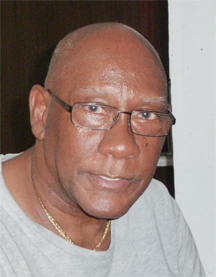Former president of the Guyana Football Federation, Georgetown Football Association and Pele Football Club, John Yates, yesterday gave props to the corporate bodies sponsoring school football tournaments, but said more needs to be done to develop the game and urged that they collaborate.
Yates, in an exclusive interview with Stabroek Sport yesterday noted that Digicel, Scotiabank and Pepsi are doing their part in trying to resuscitate sports in school but said more has to be done because it should not just be about playing football, but also doing other developmental works.

“I am hoping that Digicel will sit with Pepsi and Scotiabank, the Ministry of Education and Ministry of Sport and possibly in the years ahead have one programme that really helps to develop football and not just competitions,” the former player said.
He noted that while he was focusing on football, the problem was with sports in general and it is the students who are being short changed. “It seems that our nursery for sportsmen has died,” he added.
Making reference to the Scotiabank/Pepsi schools tournament, Yates said, “the programme was started [to try] to get the teachers exposed to training methods because you can’t just go and play football. There are a lot of people playing football who don’t know the rules…. They believe that they are the best in the world but they don’t know the basic skills.”
It is against this backdrop that Yates made the call for a collaborative effort among the three entities to truly push the sport.
“People go to see these games because they are organized programmes and I think with what we are seeing from Digicel, Scotia and Pepsi… Efforts should be made to have a national programme.” He said there should be coaching in schools so that the children would understand rules of the game and to participate in refereeing.
The result, according to Yates, would be a whole cadre of young people both men and women who can then go into the clubs, giving national selectors a wider pool of players to choose from.
The sub-associations, he said, need to have the opportunity to play a greater role in the development of school programmes.
“My concern is not so much about the playing of the game but that the people who are playing understand the rules of the game… what has been done to prepare them in terms of coaching?” he asked. “In Guyana you just hear about one or two people as football coaches, but we have to produce a whole cadre of coaches throughout the country to work in schools and clubs.”
He said too that corporate sponsors, instead of doing disjointed competitions, should collaborate in the school programmes in order for there to be a feeder in the long run, in the interest of the national team.
As a past student of Queen’s College, Yates said, he participated in football, cricket and track and field but today that has changed.
“A couple of years ago I came back home and went to QC and raised with the principal not seeing QC involved in sports and was astonished with the reply. She said that sports have to compete with extra lessons. My thinking was that we have incompetent people teaching, therefore the children have to get extra lessons”.









